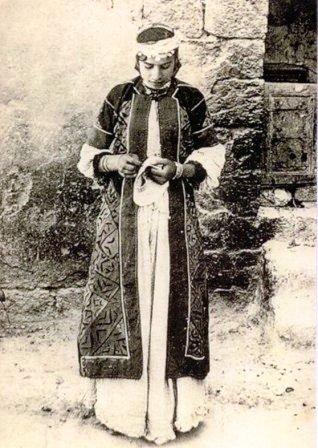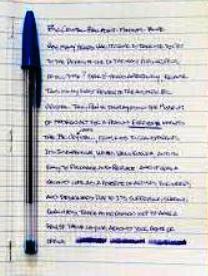SMALL IS … : Jim C Wilson celebrates a compact but perfectly formed collection by the late Pearl Blink
 Wee
Pearl Blink
Tight Press, 2008
ISBN: 987-6-54321-098-7
8pp £8 pbk.
Wee
Pearl Blink
Tight Press, 2008
ISBN: 987-6-54321-098-7
8pp £8 pbk.
At last, someone has had the good sense to assemble a collection of poems by that gifted minimalist, Pearl Blink. The enterprising Buck Sheen of Tight Press deserves our heartfelt thanks. These poems have appeared in a diversity of magazines (one of the longer pieces is regularly requested on BBC Radio 4’s Poetry Please!) but it is a joy to have them to read and reread in one handy and handsome volume.
Blink was never one to court the limelight and, since her premature death in 2000, at the age of 32, little serious attention has been given to her work. The publication of Wee should improve matters greatly.
The pivotal poem of the collection is surely ‘Pen’. I will quote it in its entirety:
I am
Bic.
 For most of her adult life, Blink belonged to the strict Northumbrian sect, The Tillers. They rigorously eschew anything which might be deemed modern or mechanical and, indeed, Blink usually wrote with a quill pen fashioned from a pheasant’s feather. The casual reader, unaware of these facts, might see ‘Pen’ as a poem expressing contentment – self-satisfaction, even. Could it be a celebration of practicality and plasticity? Oh, no: that would be a crass misinterpretation. We are to be guided by the precisely-placed line-break which lets us know that Blink is addressing the humble ballpoint pen directly and is telling it that she exists, she is, despite its invention (and, by implication, the invention of most other new-fangled devices and contraptions).
For most of her adult life, Blink belonged to the strict Northumbrian sect, The Tillers. They rigorously eschew anything which might be deemed modern or mechanical and, indeed, Blink usually wrote with a quill pen fashioned from a pheasant’s feather. The casual reader, unaware of these facts, might see ‘Pen’ as a poem expressing contentment – self-satisfaction, even. Could it be a celebration of practicality and plasticity? Oh, no: that would be a crass misinterpretation. We are to be guided by the precisely-placed line-break which lets us know that Blink is addressing the humble ballpoint pen directly and is telling it that she exists, she is, despite its invention (and, by implication, the invention of most other new-fangled devices and contraptions).
‘Pen’ is a poem that celebrates being, and stays true to Blink’s Tiller approach to life. It is also, of course, a hilarious pun (Blink was a tireless practical joker). The complete poem suggests the single word, “iambic”, while appearing to be written in free verse. However, the opening line is one iambic foot, and Blink’s underlying message is that it is the iambic section, the traditional section, which matters most: “I am”.
The Tillers are based in and around the Northumbrian hamlet of Rennington, and it was there that Blink involved herself in her second great love, apiary. Had she lived longer, would we have had some delightful little poems about honey? Who can tell? Wee, however, does include the terrifying ‘The Swarm’:
Bee, bee,
bees.
So perfectly succint. Do I hear buzzing? Yes. There’s a bee. And another. And, help, run!
We can try to tame nature. We can destroy it (inevitably we think here of Wordsworth’s ‘Nutting’) but it has the power to return, to be reborn, and, in some cases, destroy us (earthquakes, tornadoes). So many messages, in three words. ‘The Swarm’ is Blink at her expansive best.
I have committed several of the Wee poems to memory, but there is one in particular which I find myself reciting aloud in quieter moments:
Remedial
Atishoo!
A tissue.
The precariousness of our existence is again hinted at. The only remedy available is a thin sheet of paper. The lines sound the same, but are different. Here, we can’t trust our ears. Can we trust what we hear on the radio, or what our political leaders tell us? But Blink’s message is never without hope. In ‘Remedial’ we have two perfect amphibrachs. We have balance in the traditional metre; the old methods can bring redemption, and a future. The poem is also quite funny.
I understand that this slim publication is not a collected works. Blink enthusiasts are currently examining her exquisitely-written manuscripts at the University of Acapulco, and it is rumoured that a previously unknown three-line poem, ‘Am I?’, has been discovered. As we await the complete literary legacy of Pearl Blink, thankfully we have the riches of Wee to console and inspire us.
Dec 14 2022
SMALL IS ….
SMALL IS … : Jim C Wilson celebrates a compact but perfectly formed collection by the late Pearl Blink
At last, someone has had the good sense to assemble a collection of poems by that gifted minimalist, Pearl Blink. The enterprising Buck Sheen of Tight Press deserves our heartfelt thanks. These poems have appeared in a diversity of magazines (one of the longer pieces is regularly requested on BBC Radio 4’s Poetry Please!) but it is a joy to have them to read and reread in one handy and handsome volume.
Blink was never one to court the limelight and, since her premature death in 2000, at the age of 32, little serious attention has been given to her work. The publication of Wee should improve matters greatly.
The pivotal poem of the collection is surely ‘Pen’. I will quote it in its entirety:
I am Bic.‘Pen’ is a poem that celebrates being, and stays true to Blink’s Tiller approach to life. It is also, of course, a hilarious pun (Blink was a tireless practical joker). The complete poem suggests the single word, “iambic”, while appearing to be written in free verse. However, the opening line is one iambic foot, and Blink’s underlying message is that it is the iambic section, the traditional section, which matters most: “I am”.
The Tillers are based in and around the Northumbrian hamlet of Rennington, and it was there that Blink involved herself in her second great love, apiary. Had she lived longer, would we have had some delightful little poems about honey? Who can tell? Wee, however, does include the terrifying ‘The Swarm’:
Bee, bee, bees.So perfectly succint. Do I hear buzzing? Yes. There’s a bee. And another. And, help, run!
We can try to tame nature. We can destroy it (inevitably we think here of Wordsworth’s ‘Nutting’) but it has the power to return, to be reborn, and, in some cases, destroy us (earthquakes, tornadoes). So many messages, in three words. ‘The Swarm’ is Blink at her expansive best.
I have committed several of the Wee poems to memory, but there is one in particular which I find myself reciting aloud in quieter moments:
Remedial Atishoo! A tissue.The precariousness of our existence is again hinted at. The only remedy available is a thin sheet of paper. The lines sound the same, but are different. Here, we can’t trust our ears. Can we trust what we hear on the radio, or what our political leaders tell us? But Blink’s message is never without hope. In ‘Remedial’ we have two perfect amphibrachs. We have balance in the traditional metre; the old methods can bring redemption, and a future. The poem is also quite funny.
I understand that this slim publication is not a collected works. Blink enthusiasts are currently examining her exquisitely-written manuscripts at the University of Acapulco, and it is rumoured that a previously unknown three-line poem, ‘Am I?’, has been discovered. As we await the complete literary legacy of Pearl Blink, thankfully we have the riches of Wee to console and inspire us.